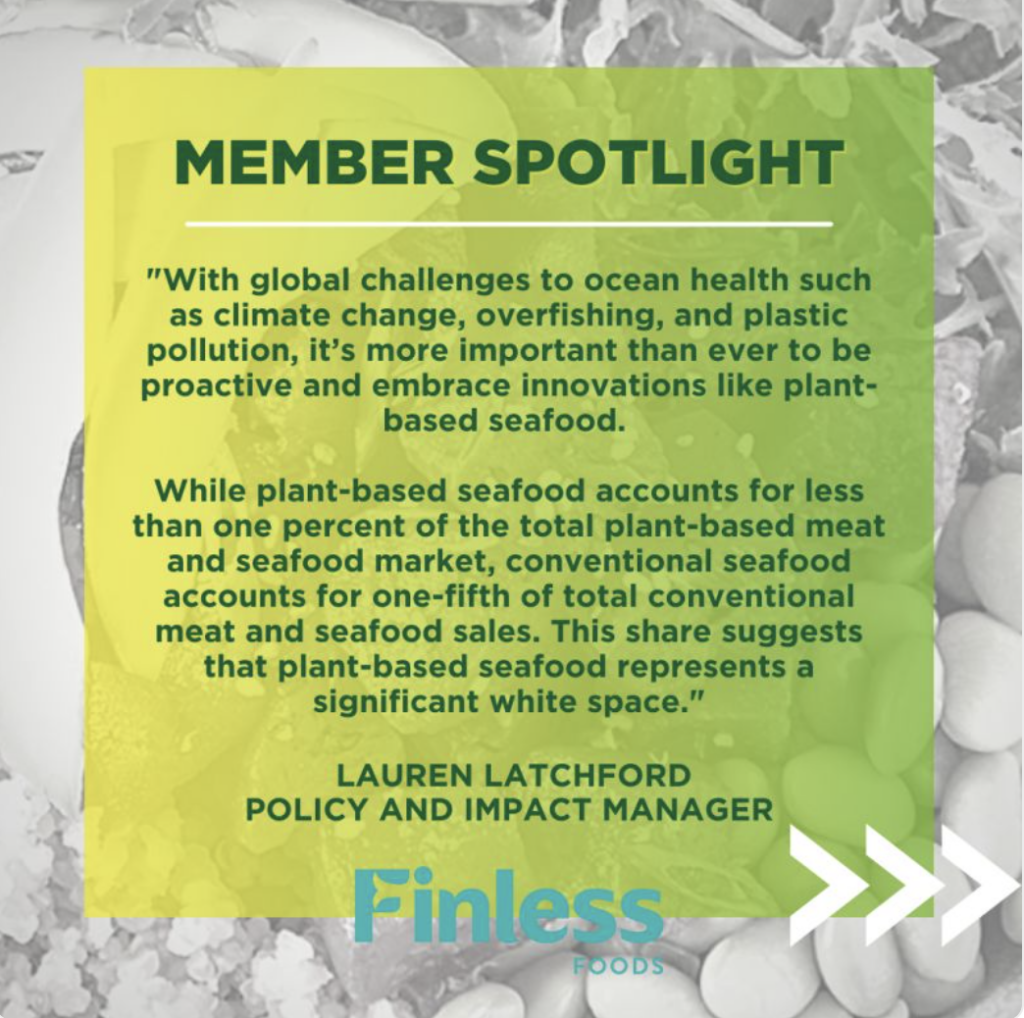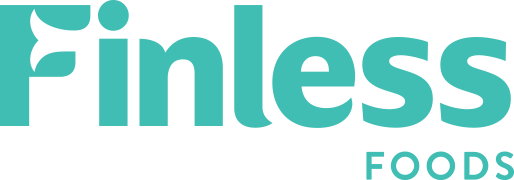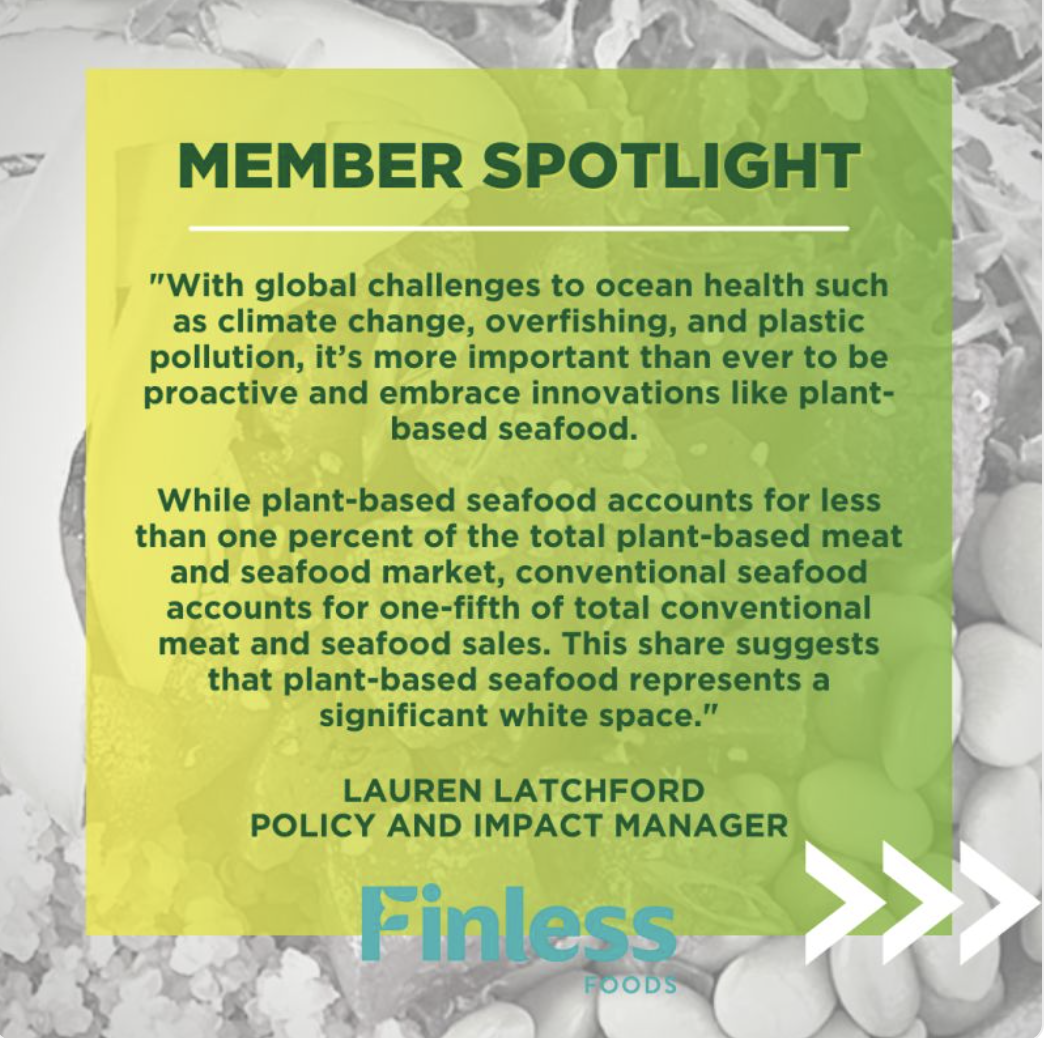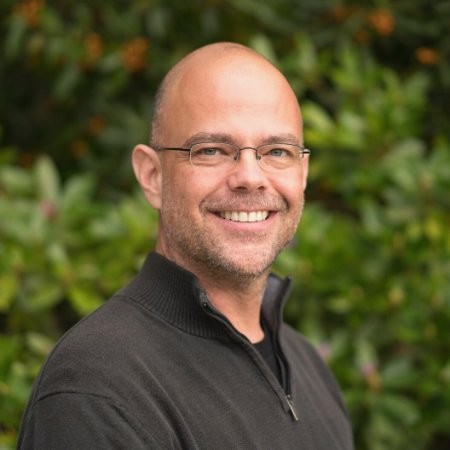
Originally featured on Plant Based Foods Association (PBFA) — the organization interviewed our very own, Lauren Latchford, Policy and Impact Manager at Finless Foods. With an extensive background in fish habitat protection and Atlantic highly migratory species management, Latchford was drawn to Finless Foods with an ambitious plan to dive into ocean conservation head first. Now equipped with an informed, sustainable mission and a delicious product to boot, Finless Foods enters this year poised to advance a future for seafood in which the ocean thrives. Read her full interview below:
One of the goals of this series is to help shine a light on the stories and individuals behind the companies. Can you tell us a bit more about your background and how you came to work in the plant-based food space?
First, let me tell you: I am a HUGE fish nerd! So I’m going to be gushing about fish throughout this spotlight. I have a background in fisheries management and policy. Prior to coming to Finless Foods, I worked at the National Oceanic and Atmospheric Administration’s National Marine Fisheries Service, a.k.a. NOAA Fisheries, for eight years on fish habitat protection and Atlantic highly migratory species (tunas, sharks, billfish, and swordfish) management. Those two areas really gave me insight into how our federal government protects and manages our most vulnerable fish habitats and species, all while increasing our domestic seafood supply.
It’s a delicate balance, especially as we are seeing climate impacts on our ocean ecosystems and commercial catches of wild species plateau. I felt the urge to do something more to conserve our wild-caught fisheries and help manage our global seafood consumption, and that’s when I came across Finless Foods. Finless envisions a future where our ocean benefits from diverse seafood consumption that includes alternatives like plant-based seafood. I’m excited to be working for a company that has delicious plant-based seafood options that are good for you and good for the planet.
What is your big “why” for working in the plant-based food industry? Is there a particular cause or fact that you learned that motivated your work and passion?
Finless Foods’ mission answered my big “why” for working in the plant-based food industry: Finless wants to create a future for seafood where the ocean thrives. With global challenges to ocean health such as climate change, overfishing, and plastic pollution, it’s more important than ever to be proactive and embrace innovations like plant-based seafood. While plant-based seafood accounts for less than one percent of the total plant-based meat and seafood market, conventional seafood accounts for one-fifth of total conventional meat and seafood sales. This share suggests that plant-based seafood represents a significant white space.
And when thinking about our plant-based tuna, tuna is the most consumed and second most wild-caught fish in the world. These species can take anywhere from 4-6 years to mature and they live an average of 15 years, but some can live over 40 years! By diversifying our consumption to include plant-based options alongside wild-caught, farm-raised, and cell-cultured food products, we can reduce the pressure on tuna stocks and other in-demand species. So we think offering a delicious plant-based alternative to tuna is one way to make a big difference.
What do people need to know about Finless Foods’ mission, values, and objectives?
Finless was founded on the central mission ‘to create a future for seafood where the ocean thrives.’ We strive to do so by producing alternative, sustainable seafood products, both plant-based and cell-cultured, starting with tuna, that can satisfy your cravings for your favorite seafood dishes while also diversifying our sources of seafood supply to reduce pressure on global fisheries in support of a thriving ocean.
Finless’ mission serves as our daily North Star, guiding everything we do from developing our forward-looking business strategy to the near-term product pipeline, all so that we can maximize our positive impact on the ocean.
We see from your blog that the Finless Foods team plays an active part in conservation, ocean, and wetland protection in your community. Can you share more with us about the team’s experience volunteering in coastal cleanups and giving back to the wildlife communities of the Bay Area?
At Finless, we live out our mission not just by creating plant-based seafood – but also by taking responsibility for our choices that affect the environment. That’s why Finless Foods gives back to our community and our planet through volunteer days.
On September 14th, 2022, our team volunteered with the Golden Gate Audubon Society in honor of California’s 38th annual Coastal Cleanup Day. We headed to Martin Luther King Jr. Regional Shoreline Park in Oakland, just eight miles south of our headquarters in Emeryville, and spent quality time outdoors beautifying our local coastline. Martin Luther King Jr. Regional Shoreline Park has experienced a significant decline in species due to a lack of native plants. What was previously 2000 acres of wetland, 750 acres remain. We set out to remove as many invasive plants as possible, and by the end of the morning, we had removed four 30-gallon bags of invasive plants from the coastline and countless bags of trash. The team felt such a huge sense of accomplishment and is eager to do more for the wildlife communities around the Bay. We have already started planning our next volunteer day for April 2023.
Can you tell us more about the innovative ingredients used to make Finless Foods tuna?
Finless plant-based poke-style tuna is minimally processed, low in sodium, contains Omega-3 fatty acids, and is made of nine whole, plant-based ingredients to mimic the taste and texture of wild-caught tuna. The main ingredient is a superfood called ‘Ash Gourd’ — better known as winter melon. Winter melons are comprised of 96% water and are very low in calories, fat, protein, and carbohydrates. We chose winter melon because the dehydration and stewing process allows us to mimic mouth-feel and bite that more closely resembles a structured piece like poke and it takes to flavors really well.
Finless Foods speaks about ‘impact’ online and has set a commendable goal of a holistically impactful 2023. With climate change’s harmful impact on the natural biodiversity and wildlife habitats of our oceans, lakes, rivers, and beyond, what are your plans to make an impact in the coming year and how did you decide to prioritize?
Finless Foods puts its impact front and center and that is why we have a first-of-its-kind Impact Board to serve as a brain trust of ocean and sustainable seafood experts that inform Finless’ forward-looking business strategy, from product pipeline to stakeholder engagement.
We recently met with our Impact Board to discuss our 2023 sustainability goals and future species selection for our alternative seafood. Our sustainability goals will inform how we determine our facility manufacturing, lab practices, and supply chain management. These goals will align with the FAIRR & GFI Alternative Proteins ESG Reporting Framework, a first-of-its-kind framework for alternative food companies, including plant-based companies, to reveal their climate, biodiversity, nutrition, and other environmental, social, and governance (ESG) impacts. And for our future species selection, we developed sustainability criteria that will help us ensure we properly consider sustainability when selecting new species for Finless products. We’re excited about 2023 and look forward to revealing our new products to you soon!
Based on your experience, what advice would you share with other aspiring plant-based founders?
Passions can take many forms and shift over time. For me, my passion for fisheries started by managing commercial fishing and shifted to finding innovative ways to keep our oceans healthy while providing delicious plant-based seafood to consumers. It’s scary to make the transition, but jump in with two feet and you’ll be surprised how much your previous skills can help your future self and future career in the plant-based space.
Can you give us a sneak peek into any notable news or exciting product launches in the pipeline for 2022?
Finless is hard at work creating sustainable, delicious, and versatile cell-cultured and plant-based seafood alternatives, tackling tuna first and then expanding to additional species. Not only will this supply an additional source of tuna alternatives to reduce pressure on global, wild-capture tuna stocks, but it also enables consumers to diversify the ways they enjoy the popular and crave-able seafood dishes they love, like poke and sushi, so that it’s good for us, and good for the ocean. Follow us on social to be the first to know about future product launches — coming soon!
Where can we learn more about Finless Foods?
Consumers interested in our plant-based tuna can learn more about our company, mission, and products by visiting our website: www.finlessfoods.com. Foodservice operators interested in learning more about our offerings can visit our culinary website: www.finlessculinary.com. Finless fans can also follow us on Twitter (@finlessfoods), Instagram (@finlessfoods), Facebook (@Finlessfoods), and LinkedIn (/finlessfoods).


